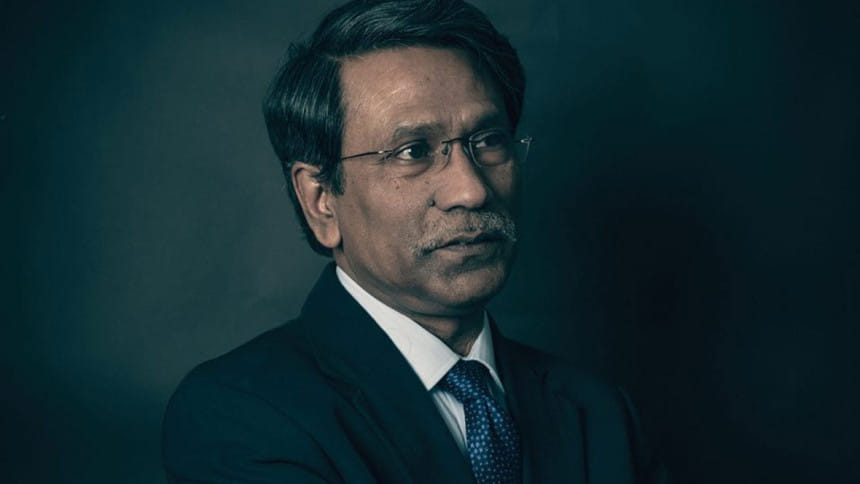Will Trump’s USD 400m debt be a threat to US national security?

A report by The New York Times that US President Donald Trump did not pay federal income taxes has raised the question about how much impact it will have on the upcoming US election. Ali Riaz, distinguished professor of politics and government at Illinois State University in the United States and a non-resident senior fellow at the Atlantic Council, talked to Golam Mortoza of The Daily Star on the issue. The interview was taken before the presidential debate held on September 30.
Will the issue of tax evasion by US President Donald Trump affect the elections?
Mr. Trump's already weakened moral position will, in all likelihood, further deteriorate in the coming days. Because paying taxes is a sensitive issue in the United States. Everybody has to pay taxes. People here believe that they are playing their part for society through paying taxes and that they are entitled to certain rights in exchange for paying taxes. On the other hand, there are those who do not want to pay taxes. A majority of them are the supporters of Trump who think the state is taking away a lot of money from them already. But these people also have to pay taxes. Now that they know that their leader does not do so, it will create a kind of emotional and moral pressure on them. However, we do not know if they will change their mind about voting for Trump. The fact that Trump didn't pay taxes means that he didn't play his role in ensuring national security and that he didn't pay a penny for the country's healthcare system. Although he has repeatedly said that he has done a lot for those who have returned from the war, he didn't agree to give a single penny from his own pocket. These are some of the issues Mr Trump will have to deal with.
Trump spoke against The New York Times report last Monday by claiming: "This is fake news, I have paid a lot of taxes." Is this just another untrue statement by him? Or are there any chances that questions might arise about the Times report? What is your observation?
It cannot be denied that Mr. Trump sometimes paid taxes. He paid USD 750 in federal income taxes in the year he took office as president and also the year before. But he did not pay any taxes in 10 years of the 15 years from 2000 till 2015. Mr. Trump claimed that he paid USD 95 million in taxes in 18 years. But he took back USD 72.9 million from the federal government. Although he has taken various tax credits through various loopholes in the system, he did not pay the taxes he was supposed to.
So he has taken tax credits according to the law. Can that be questioned?
It has not yet been proved that he did anything illegal. Maybe he did this within the purview of the law. However, when a politician takes advantage of the loopholes of the law, it becomes questionable. Here in the US, politicians, especially those who became presidents, have tried to show people that they did not try to take any advantage of the legal loopholes despite having the scope to do so. President Jimmy Carter once even said that he should pay more taxes than what he did then. He not only said that but also paid more taxes than what he was supposed to. You can also take an account of the taxes paid by other US presidents in the first fiscal year of their term. President Barack Obama paid more than a million dollar in taxes. So, the key issue here is the ethical aspect of taking advantage of the system.
What kind of a situation might the Times have to deal with under the circumstances?
The New York Times would not have to face much trouble because they have enough evidence and documents in support of their report. We know what Mr. Trump will do. He has waged a war against the media in the last three years and a half. He speaks or tweets more or less every day against the media, especially against the liberal newspapers; he calls the media "the enemy of the people". He doesn't like The New York Times at all. Which is why he will continue to attack this newspaper through these statements. But I don't see any reason to worry that it will be under any legal pressure; there is no such law. If Mr. Trump's lawyers think that there is any gap anywhere, they can at best go to the court. In that case, the Times will be able to deal with the issue through the legal process.
Joe Biden, Trump's rival in the upcoming election, paid USD 37,42,974 in federal income taxes while Trump paid only USD 750. Trump is known to be richer than Biden. Don't you think it will have an impact on the election?
Electoral politics in the US has become so polarised that I don't think or hope that there will be a major crack in Trump's support base. But as is always the case, there are people who remain in the middle ground. Although the number of such people is very low this time, this issue can have an impact on their opinion. But that will depend on how well they understand all the information. Apart from Trump's tax evasion, The New York Times report also pointed out another important fact: the amount of Mr. Trump's debt, which will have to be paid in the next four years.
What measures will he take to repay this huge amount of loan? Is his personal debt becoming a threat to national security? The big question is, from where will this money come? Who will give Trump the money and in exchange for what? These questions are already being raised. If elected, he will be president for the next four years, in which case he will be financially liable to some quarters.
Any businessman can have debts, they can take loans. Trump's main identity is, he is a businessman. So why do you think this is such an important issue?
He can of course have debt as a businessman, but as a president, he cannot. The president owes USD 400 million to someone and he is supposed to pay this money within the next four years. How will he pay this money? Will national security be disrupted? We can't say for sure that it will disrupt national security but ethically, it is a big risk. Mr. Trump is a businessman but he is no longer just a businessman. As a businessman, he should have taken care of his debt long ago. The question of ethics comes when, even after taking charge as president, he is financially liable to someone or some quarters. The question is, if a president goes to the White House with such financial liability, will it affect his work in any way? Trump has always said that he is a successful businessman. But as it turns out now, he is not. To take tax credits he now calls himself a failed businessman.
The unfortunate truth is that President Trump has paid less taxes than what I have in the last 15-16 years, and sometimes he didn't pay taxes at all. This should be a big issue for any ordinary middle-class American citizen. However, I am more concerned about whether or not his USD 400 million debt will become a threat to America's national security.
Speaking of ethics, how sensitive is the American society about this ethical issue? President Trump has been criticised for many of his statements and deeds before. However, do you think the present controversy has created the most critical situation for him?
Not only on ethical grounds, but strategically too, the situation in which he is going to the polls has really become challenging for him. The things that he has said in his years as president and some of his actions even before that were always considered ethically unacceptable to people. But that may not be the case now. That does not mean that people have accepted everything. The question of ethics is still important in American society. But are those who care about ethics the majority in society? We will know that in November or maybe even before that.
The interview has been translated from Bangla by Naznin Tithi, a member of the editorial team at The Daily Star.

 For all latest news, follow The Daily Star's Google News channel.
For all latest news, follow The Daily Star's Google News channel. 



Comments